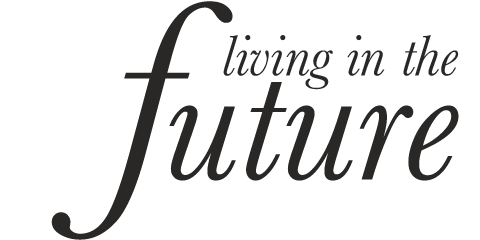Llew Watkins
Hinterland Shift (part five of nine) from Living In The Future on Vimeo.
She is in the Jewellery Quarter, Birmingham, looking through a shop window. The display is dirty and fallen down, but pinned sporadically to the glass are tiny fluorescent spiky shapes, yellow and pink. On each shape is written in blue magic marker ‘endtime com’.
She is on a train thru German country. There is snow. Across from her, the hissing sound of the boy’s headphones goes dead. Feel the train jarring, halt. The people around her – vague shapes – are beginning to stand and peer through the windows. Emily looks at her watch; it reads thirteen-oh-eight. The second hand has stopped moving. It twitches pathetically.
The endtime comes first as a nagging absence; the elves are no longer in attendance. Though her mind is fogged, thru the trajectories of experience she begins to know a hollowness in things. In moments of greater clarity, she notices how the more peripheral characters in the dreamscape are beginning to fade.
Her connection with Kai is gone.
The correlation between the outer state and the inner state frightens her. Emily cannot talk about these inner movements: they start as thoughts on the fringes of her consciousness. When, in fear, a second thought automatically tries to fight or suppress the first, engorged by this hostility, the initial doubt grows bloody.
It’s clinical, or it’s utilitarian; straight away. Sometimes the realisation is one of death. Seeing the total non-existence of a single part of the system, she is broken, suddenly, with the weightlessness of the totality. This revelry she can almost take, but the nihilism that comes after leaves her grasping for breath; in the bathroom, her breasts against the hard floor and the comforting solidity of green ceramic.
At first these are isolated incidents, pinpricks in a page. And then more and more, the page a delicate shell, and then dissipated completely. One continuous panic attack happening and the inner movements reflected exponentially in the scenes that Emily traverses.
Everywhere the codices are burning. Everywhere is the grinning face of a Spanish Bishop. Emily thinks she sees Kai, but it is just a dented sign.
She discovers that her old dog has become pregnant. It is unlikely, and not only because he is a he. Emily is filled with happiness; it is quite unbelievable. Then her dog coughs up the mechanism, the organ used to develop the child (it is a child).
‘I am not my body’ she thinks, ‘my body is a lie’. These words, before, concealed a truth that freed, but now the words themselves are rigid, nihilistic and impotent. In a court case it is announced that both dog and child are dead.
Look at an apocalypse from the inside out. The bare logic of mind-made world, disintegrated until inevitable collapse. There is almost no one but Emily now. All the flesh on her legs is hanging off in tatters, she can just see the bone like spine.
An anger rises up in her. It is as deep as the earth, rage she has not let herself feel for years. It claws wet at her chest, mixing with the panic and confusion. Her thoughts are murder, but strangely domestic and repetitive, uncorrelated to the actuality.
The last human character is a female masker. On the floor are dead apples the size of melons, some split and crushed, some whole but rotting. The masker changes and is now a little floating head, the tongue pressed childishly flat against the upper lip. The head is a girl with the saddest eyes. Emily knows that she has seen her before. As she realises that she is looking at herself, the girl disintegrates and Emily is finally, completely alone. The loneliness is dreadful and vague. It opens up a gap that cannot be solved.
And then they come. They have always been in love with her, the predatory instinct birthed in a phenomenal hunger. Lit up like neon, the cable butchers flicker at the edges of her eyes.
Emily’s body long since gone, the mind that is left is like muddy space, her sense of self all but washed away except for a nulled sense of stuck.
The remnants: a total quiet, open space. Loneliness. Only space.
(continued…)
Llew Watkins is a multi-disciplinary artist and writer currently based in London who works in installation, lectures, scripts and performance. His practice is a continuing inquiry into the transient and playful nature of mind and reality.
